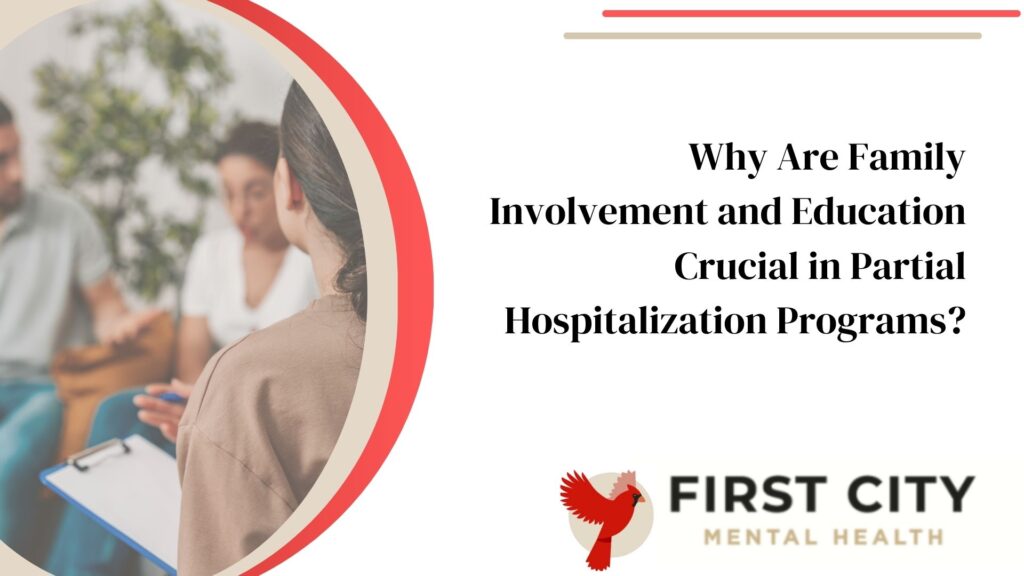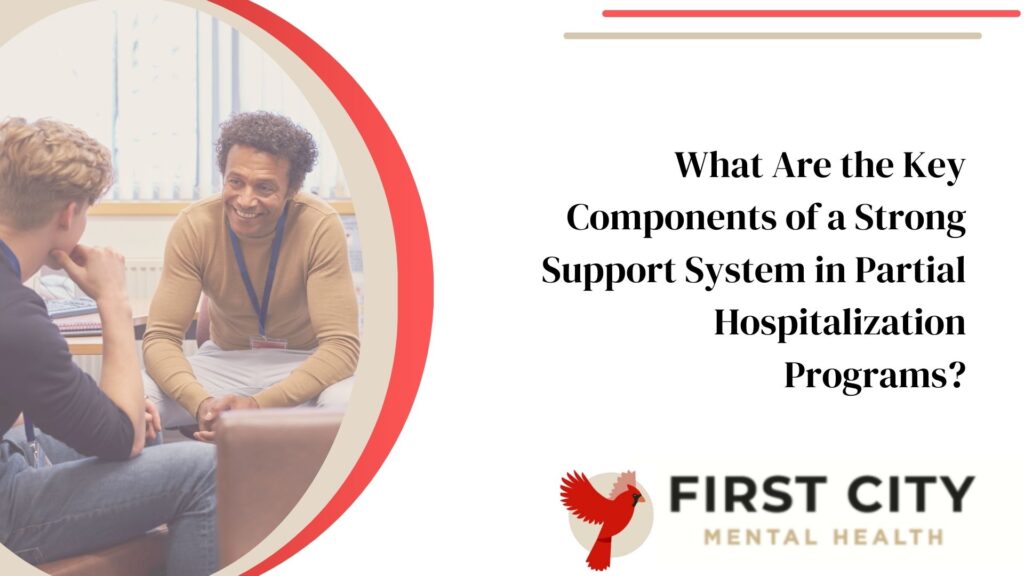
When to Consider Residential Mental Health Treatment in Kokomo?
August 15, 2025
Why Choose Intensive Outpatient Indiana?
August 20, 2025Struggling with mental health concerns can often feel isolating, but finding the right level of care is crucial for recovery. Partial hospitalization program (PHP) offer a bridge between inpatient hospitalization and outpatient treatment, providing intensive support without requiring an overnight stay.
This care model combines therapy, medication management, and community resources to help individuals manage symptoms while maintaining daily life activities.
An essential fact about PHPs is that they typically last 30-45 days, offering day-long treatment sessions that allow patients to live at home or in community housing. Our article explores how these programs build robust support systems around patients, enhancing their journey toward independence and improved mental health.
Discover the integral roles of peer networks, family involvement, and therapeutic guidance in this comprehensive approach to care.
Read on for insights into building a stronger tomorrow.
Key Takeaways
- Partial hospitalization programs (PHPs) help people with mental health problems by offering intensive day treatments and letting them go home at night. They mix therapy, medicine help, and finding community services to improve patient mental health.
- These programs offer group therapy, where patients share stories and support each other. Patients also receive one-on-one treatment to focus on personal issues and medication management for their health needs.
- Through special teaching sessions, families learn how to help their loved ones in PHPs. This strengthens family support when the patient returns to daily activities like work or school.
What Types of Support Systems are Integrated into Partial Hospitalization Programs?
Partial hospitalization Kokomo programs (PHP) include critical support systems such as group therapy, individual therapy sessions, and medication management. Group therapy allows patients to share experiences and learn from others facing similar issues.
Individual sessions provide personalized attention to address specific mental health needs. Medication management ensures patients receive the correct dosages of their prescriptions, optimizing their treatment plans.
These programs also connect patients with community resources and family education sessions. Community resources help find services needed after treatment ends, like housing or job assistance.
Family education strengthens the support circle at home, teaching loved ones how to help effectively during recovery.
How Do Partial Hospitalization Programs Foster Peer Support Networks?

Moving from the integration of support systems, mental health partial hospitalization program also excel at building peer support networks. These programs organize group therapy sessions lasting 6-8 hours each day.
During these sessions, patients connect with others facing similar challenges. This setup encourages sharing experiences and coping strategies. It turns the group into a supportive community where every member plays a crucial role in their own and others’ mental health recovery.
Groups in partial hospitalization programs meet regularly, often from Monday to Friday, creating a consistent space for members to offer mutual support. Patients learn to give and receive crucial emotional support by discussing daily functioning and treatment goals.
Facilitated by mental health professionals, these groups ensure that discussions are helpful and structured to improve the mental health of adult patients within the safe environment of the program.
Where Can Patients Access Community Resources Through Partial Hospitalization Programs?
After learning about peer support in partial hospitalization program mental health, it is crucial for patients to know where they can find community resources. These programs link patients with vital services outside the treatment center.
Patients get help to connect with local housing options, job assistance, and educational opportunities. This support is essential for those living at home or in sober living facilities while attending the day program.
PHPs work closely with various community organizations to ensure every patient has access endorsed by their care team. From Monday through Friday, individuals participating in a PHP can also learn how to manage out-of-pocket costs and understand their insurance coverage better, making these resources accessible without overwhelming financial stress.
Why Are Family Involvement and Education Crucial in Partial Hospitalization Programs?

Family members play a vital role in the success of the partial hospitalization program PHP. Their involvement and education about mental health care are crucial for several reasons. First, they provide emotional support that is essential for recovery.
Understanding the challenges faced by their loved ones helps family members offer the right kind of encouragement and empathy. Second, educated families can ensure continuity of care at home.
After program completion, they learn techniques to help manage symptoms and reduce relapse risks.
Educational sessions within these programs equip families with the tools to deal with mental health issues effectively. These sessions cover topics like coping strategies, medication management, and recognizing signs of distress.
Families who understand these aspects can better support their loved one’s journey towards independence and returning to work or school.
Families empowered with knowledge become invaluable allies in treatment.
When Do Patients Experience the Most Benefit from Support Systems in Partial Hospitalization Programs?
Patients get the most help from support systems in Indiana partial hospitalization programs during their first few weeks. This is because they adjust to changes after leaving a residential program.
They are ready to blend back into society but still need strong support. Groups, therapy, and family education play significant parts here. Support helps them feel less alone and builds skills for handling daily life.
The end of their program is another critical time for benefits from support systems. Here, patients learn how to use community resources and maintain connections made during treatment. They work on plans with therapists to keep up their progress outside the program.
Staying linked to support networks ensures they continue moving forward after finishing the 30-45-day treatment cycle.
What Role Do Therapists Play in Enhancing Support Systems in Partial Hospitalization Programs?
Therapists in partial hospitalization program PHP provide critical support through individual therapy sessions. They work closely with patients, focusing on specific strategies for mental health improvement.
These professionals play a crucial role in medication management, ensuring patients receive the correct dosages and combinations to support their healing process. By doing this, therapists enhance the overall support system of the program, making it more effective for everyone involved.
They also foster connections among patients, encouraging peer support networks within the program. This helps create a community atmosphere where individuals feel understood and supported by staff and others facing similar challenges.
Therapists guide group psychotherapy sessions, promoting shared experiences and mutual aid among participants. Their expertise ensures patients access to comprehensive care that is suited to their needs during the program.
How Do Partial Hospitalization Programs Facilitate Ongoing Support After Treatment?
The journey into ongoing care begins after therapists help build robust support systems through an adult partial hospitalization program (PHP). These programs ensure patients keep moving forward after they leave the program.
PHPs connect people with community resources, making it easy for them to find the help they need close to home. They set up meetings and groups where patients can share experiences and grow together outside of therapy hours.
Patients also get plans that guide them on using their new skills in daily life. This might include managing stress or staying active in social settings. The goal is to ensure everyone leaves with a clear path to follow.
This way, support doesn’t end when the program does – it’s just the start of a healthier future.
What Are the Key Components of a Strong Support System in Partial Hospitalization Programs?

A robust support system in partial hospitalization program in Indiana relies on comprehensive therapeutic programming. This includes 6-8 hours a day of intensive treatment, covering various therapies like dialectical behavioral therapy and other mental health treatments.
These programs offer a higher level of care than outpatient services, focusing on the needs of adults in a structured environment. Patients engage daily with therapists who specialize in treating specific mental health issues, making it crucial for adequate recovery.
Key components also involve family involvement and education, peer support networks, and access to community resources. Family sessions educate loved ones about the patient’s condition and how to support them after treatment ends.
Peer groups allow patients to share experiences and find common ground, fostering mutual understanding and support. Community resources ensure patients can access ongoing care options once they leave the program.
Together, these elements form a solid foundation that supports healing and promotes long-term wellness.
Conclusion
A partial hospitalization program offers strong support through group therapy, individual counseling, and skill-building. It also connects patients to community resources and involves families in treatment.
These programs help people return to daily life with confidence. Peer networks provide lasting friendship and encouragement. Everyone gets the tools they need for a better future.
F.A.Q.s
What is a partial hospitalization program (PHP)?
A PHP, including those in Indiana, like the adult partial hospitalization program in Kokomo, is a mental health treatment program that provides more intensive treatment than typical outpatient care but doesn’t require an overnight stay like an inpatient program.
Who can participate in a partial hospitalization program?
Adults meeting specific requirements determined by their insurance company or Medicare can attend these programs. It’s best to contact your provider to determine if you qualify for this type of mental health support system.
How does attending school work with a PHP?
Individuals can often schedule their participation around school hours since they don’t have to stay overnight at the facility like they would for complete inpatient care.
Is the cost of a PHP covered by my insurance company or Medicare?
Yes, most often! However, it’s essential to determine coverage details and any potential out-of-pocket costs with your specific provider before starting the program.
How does a Partial Hospitalization Program enhance support systems?
PHPs offer more intensive treatment than outpatient services, which allows patients better access to healthcare professionals and structured therapy sessions, enhancing overall mental health support systems.






